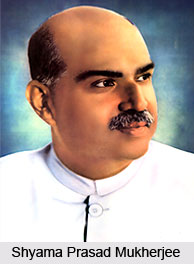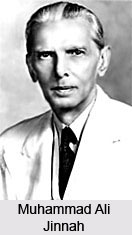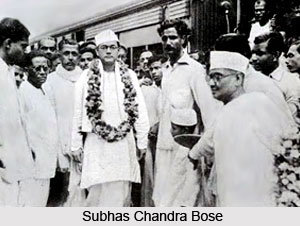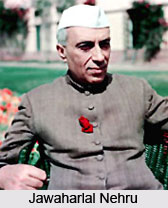 Shayma Prasad Mukherjee is considered the godfather of modern Hindutva and Hindu Nationalism. He inherited a rich tradition of erudite scholarship, fervent nationalism and fearlessness from his illustrious father, Sir Asutosh Mookerjee. Mukherjee founded the Bharatiya Jana Sangh, the first Hindu nationalist political party of its kind, and was also the leader of the Hindu Mahasabha and closely associated with the Rashtriya Swayamsevak Sangh. His death created a void in the public life of the nation as a whole and of West Bengal in particular, which is hard to fill. He was one of the few persons who could have given a lead to the intelligentsia of West Bengal in the difficult situation arising out of partition.
Shayma Prasad Mukherjee is considered the godfather of modern Hindutva and Hindu Nationalism. He inherited a rich tradition of erudite scholarship, fervent nationalism and fearlessness from his illustrious father, Sir Asutosh Mookerjee. Mukherjee founded the Bharatiya Jana Sangh, the first Hindu nationalist political party of its kind, and was also the leader of the Hindu Mahasabha and closely associated with the Rashtriya Swayamsevak Sangh. His death created a void in the public life of the nation as a whole and of West Bengal in particular, which is hard to fill. He was one of the few persons who could have given a lead to the intelligentsia of West Bengal in the difficult situation arising out of partition.
Shayama Prasad Mukherjee was born on 6th July 1901in a Brahmin family of a high social status, to Sir Ashutosh Mukherjee, a well respected adovocate in Bengal and mother Lady Jogmaya Devi Mukherjee in Calcutta. From his parents he inherited a saga of erudite scholarship and fervent nationalism. They also inspired him to `live a pure and manly life`. Mookerjee obtained his degree from the University of Calcutta. He graduated in English securing the first position in first class and also did MA and BL. In 1923 he became a fellow of the Senate. He enrolled as an advocate in Calcutta High Court in 1924 after his father`s death. Subsequently he left for England in 1926 to study in Lincoln`s Inn and became a barrister in 1927. Since his student days, Shyama Prasad assisted his vice-chancellor father in forming the educational plans. At the age of 33, he became the youngest Vice-Chancellor of the University of Calcutta, and held the office till 1938.
Shyama Prasad`s political career was also characterized by high idealism. He was elected as member of the Legislative Council of Bengal, as a Congress candidate representing Calcutta University in the year 1929. But in the very next year he resigned when Congress decided to boycott the legislature. Subsequently, he contested the election as an independent candidate and got elected. In 1937 he was re-elected from the university constituency.
 The educational structure of Bengal seriously weakened after the Secondary Education and the Calcutta University Bills were passed. Shyama Prasad attempted to persuade the Congress leadership to oust the ministry but failed. He, therefore, rallied round himself non-Congress and non-Muslim League nationalist forces and formed the coalition ministry with AK Fazlul Huq as the Chief Minister and himself shouldering the Ministry of Finance. During this period Veer Savarkar created a deep impression on him. He emerged as a spokesman for Hindus and shortly joined Hindu Mahasabha and in 1944.
When the Quit India Movement in 1942, an important event of the Indian freedom struggle, started the British unleashed a reign of terror in the country and all the Congress leaders were put in to jail. In fact, there was no one to take up the national cause. Shyama Prasad, though a member of the government, voluntarily took up his national responsibilities. Having failed to persuade the central government to desist from its repressive measures, he decided to quit the Bengal Cabinet and to lead the national forces against the British.
The educational structure of Bengal seriously weakened after the Secondary Education and the Calcutta University Bills were passed. Shyama Prasad attempted to persuade the Congress leadership to oust the ministry but failed. He, therefore, rallied round himself non-Congress and non-Muslim League nationalist forces and formed the coalition ministry with AK Fazlul Huq as the Chief Minister and himself shouldering the Ministry of Finance. During this period Veer Savarkar created a deep impression on him. He emerged as a spokesman for Hindus and shortly joined Hindu Mahasabha and in 1944.
When the Quit India Movement in 1942, an important event of the Indian freedom struggle, started the British unleashed a reign of terror in the country and all the Congress leaders were put in to jail. In fact, there was no one to take up the national cause. Shyama Prasad, though a member of the government, voluntarily took up his national responsibilities. Having failed to persuade the central government to desist from its repressive measures, he decided to quit the Bengal Cabinet and to lead the national forces against the British.
He was a Hindu political leader who felt the need to counteract the communist but was not anti-Muslim. At the same time separatist Muslim League of Muhammad Ali Jinnah, who were demanding either exaggerated Muslim rights or a Muslim state of Pakistan. To Mukherjee, the Muslims were a minority and thus could not in any system of logic and reason be given a status superior to the majority Hindu masses. Thus Mukherjee adopted causes to unite Hindu voices, and protect Hindus against what he believed to be the communal propaganda and the divisive agenda of the Muslim League. Mookerjee and his future followers would always cite inherent Hindu practices of tolerance and communal respect as the reason for a healthy, prosperous and safe Muslim population in the country in the first place.
During the 1943 famine, his humanitarian work saved a lot of lives. Soon after the rigorous famine the shadow of partition began to threaten the stability of life. Shayma Prasad Mukherjee was a strong opponent of the Partition of India initially. But during the communal riots of 1946-47, in which thousands of Hindus all over the Bengal were killed by Muslim mobs. Hindu retaliations were also provoked. This led him to disfavored strongly Hindus continuing to live in a Muslim-dominated state and under a government controlled by the Muslim League. He put forward the argument that if at all India was to be partitioned on the communal basis; in that case Bengal and Punjab must be partitioned on the same ground.
Thus Mukherjee supported the partition of Bengal in 1946 in order to prevent the inclusion of its Hindu-majority areas in a Muslim-dominated East Pakistan. In 1947 a failed bid for a united but independent Bengal was made by Sarat Bose the brother of Subhas Chandra Bose and Huseyn Shaheed Suhrawardy, a Bengali Muslim politician, he also showed his opposition to that. He wanted the Hindu Mahasabha not to be restricted to Hindus alone or work as apolitical body for the service of masses. Following the assassination of Mahatma Gandhi by a Hindu fanatic, the Mahasabha was blamed chiefly for the villainous act and became deeply unpopular. Mukherjee himself condemned the murder and left the party.
 On the invitation of Mahatma Gandhi, Syama Prasad joined the first national Government in August 1947. Prime Minister Jawaharlal Nehru in the Interim Central Government as a Minister inducted Shayma Prasad Mukherjee for Industry and Supply. Mookerjee was widely respected by many Indians and also by members of the Indian National Congress, the main Indian political organization, and Sardar Vallabhbhai Patel, one of its chief leaders. He disagreed with the policy of the Government towards Pakistan. Mookerjee resigned from the Cabinet on 6th April 1950 on the issue of the 1949 Delhi Pact with Pakistani Prime Minister Liaqat Ali Khan. Mukherjee was firmly against Nehru`s invitation to the Pakistani PM, and their joint pact to establish minority commissions and guarantee minority rights in both countries. He wanted to hold Pakistan directly responsible for the terrible influx of millions of Hindu refugees from East Pakistan, who had left the state fearing religious suppression and violence aided by the state. Mookerjee considered Nehru`s actions as appeasement, and was hailed as a hero by the people of West Bengal. His role in the Lok Sabha as the leader of opposition earned him the title `lion of Parliament`.
On the invitation of Mahatma Gandhi, Syama Prasad joined the first national Government in August 1947. Prime Minister Jawaharlal Nehru in the Interim Central Government as a Minister inducted Shayma Prasad Mukherjee for Industry and Supply. Mookerjee was widely respected by many Indians and also by members of the Indian National Congress, the main Indian political organization, and Sardar Vallabhbhai Patel, one of its chief leaders. He disagreed with the policy of the Government towards Pakistan. Mookerjee resigned from the Cabinet on 6th April 1950 on the issue of the 1949 Delhi Pact with Pakistani Prime Minister Liaqat Ali Khan. Mukherjee was firmly against Nehru`s invitation to the Pakistani PM, and their joint pact to establish minority commissions and guarantee minority rights in both countries. He wanted to hold Pakistan directly responsible for the terrible influx of millions of Hindu refugees from East Pakistan, who had left the state fearing religious suppression and violence aided by the state. Mookerjee considered Nehru`s actions as appeasement, and was hailed as a hero by the people of West Bengal. His role in the Lok Sabha as the leader of opposition earned him the title `lion of Parliament`.
With Madhav Sadashiv Golwalkar, leader of the Rashtriya Swayamsevak Sangh, Mookerjee founded the Bharatiya Jana Sangh (Indian People`s Union) on October 21, 1951 at Delhi and became its first President. The rest of his life was spent in actively building up this party. The Bharatiya Jana Sangh strongly criticized the favoritism towards India`s Muslims by the Nehru administration. They promoted free-market economics as opposed to the socialism in Nehru`s economic and social policies. The BJS also favored a uniform civil code for both Hindus and Muslims, want to ban cow slaughter and end the special status of Muslim-majority Jammu and Kashmir. The Hindutva agenda founded by the BJS, became the wider political expression of India`s Hindu majority.
Shayma Prasad Mukherjee championed the cause of integration of Jammu and Kashmir with the rest of India. Mookerjee went to visit Kashmir in 1953, and went on hunger strike to protest the law prohibiting Indian citizens from settling in a state in their own country and the need to carry ID cards, and was arrested on 11th May while crossing border. Although the ID card rule was revoked owing to his efforts, he died as detenu on May 23, 1953 under mysterious circumstances. His death in custody raised wide suspicion across the country and demands for independent enquiry, including earnest requests from his mother, Jogmaya Devi to the then Prime Minister of India, Jawaharlal Nehru. Unfortunately no enquiry commission was set up and his death remains a mystery. His funeral in Calcutta saw an outburst of feeling, which was unusual even for that great metropolis.
 Shayma Prasad Mukherjee along with Vinayak Damodar Savarkar is considered as the godfather of Hindu nationalism in India, notably the Hindutva movement. The members and supporters of the Rashtriya Swayamsevak Sangh and the Vishwa Hindu Parishad widely honored Shayma Prasad. Atal Bihari Vajpayee to whom Shayma Prasad Mukherjee was amajor role model, made the BJS the chief Hindu conservative political party in the 1960s and 1970s, and founded its successor, the Bharatiya Janata Party. Now The BJP has become one of the two largest national political parties which had formed the Government from 1998 to 2004, with Vajpayee serving as the Prime Minister of India.
Shayma Prasad Mukherjee along with Vinayak Damodar Savarkar is considered as the godfather of Hindu nationalism in India, notably the Hindutva movement. The members and supporters of the Rashtriya Swayamsevak Sangh and the Vishwa Hindu Parishad widely honored Shayma Prasad. Atal Bihari Vajpayee to whom Shayma Prasad Mukherjee was amajor role model, made the BJS the chief Hindu conservative political party in the 1960s and 1970s, and founded its successor, the Bharatiya Janata Party. Now The BJP has become one of the two largest national political parties which had formed the Government from 1998 to 2004, with Vajpayee serving as the Prime Minister of India.
`A pure and manly life` was the ideal Dr. Shayma Prasad set before himself and he lived up to it. He was a nationalist to the core of his heart. `Country comes first` was his watchword, and he died a martyr for the cause of the country. His services were lost to the country at a time when they were most essentially required. However, his legacy will ever be fresh and will guide the political, cultural and educational activities of the nation for many years to come. The Post and Telegraphs Department feels privileged to issue a commemorative stamp in honor of this great son of India. On August 27, 1998, the Ahmedabad Municipal Corporation (governed by the BJP) named a bridge after Mookerjee. In 2001, the main research funding insitute of the Government of India named CSIR instituted a new fellowship named after him. The Shyama Prasad Mukhejee Fellowship is the most prestigious fellowship given in India for doing PhD.




















